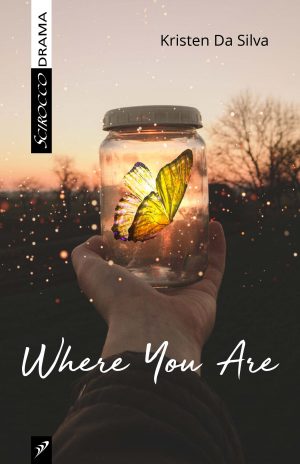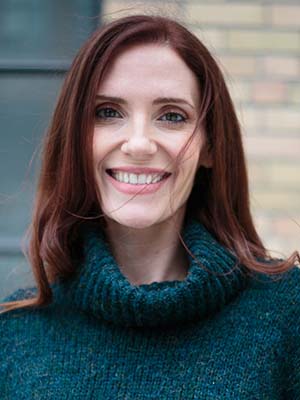Posted October 13, 2023
The Interview – Kristen Da Silva
Kristen Da Silva
Kristen Da Silva was born in Oakville, Ontario and raised in Nobleton, Ontario, a small farming community in King Township. She graduated from York University and continued her studies at Sheridan College. Her plays, which include Sugar Road, Where You Are, Gibson & Sons, Hurry Hard, The Rules of Playing Risk, Beyond the Sea, and The Bluff have been produced at theatres in both North America and Europe. Kristen is a two-time recipient of the Playwrights Guild New Comedy award. Where You Are was published by Scirocco Drama in 2022, and Beyond the Sea is upcoming for 2024.
Kristen, although your plays are often hilarious, most of them deal with very serious themes. You were once quoted as saying, “I think that comedy is a doorway to some tough conversations.” Can you expand on that for us? Why is comedy a good way to tackle life’s big questions?
I’ve always found laughing with someone the quickest way to connect with them. Maybe it’s the feeling of finding common ground combined with how good it feels to laugh, but there’s a magic in shared laughter. It makes us feel closer and more open to sharing vulnerable things with one another. I also think audiences go into a comedy with a certain sense of safety. Even if it’s going to go to some hard places, they have a reasonable expectation it’ll have, if not a happy ending, at least a hopeful one.
Your play Where You Are (Scirocco Drama 2022), about a pair of sisters on Manitoulin Island and their daughter/niece, has proved very popular with audiences and critics alike. Can you tell us how you decided to write Where You Are? Did the success of the play change your life?
I wrote Where You Are after losing my aunt to cancer, as a love letter to her and the lifelong friendship she shared with my mom. I was really struggling with the idea that I’d never see her again. Never see the two of them together again. Or all four sisters together, laughing and talking over one another at absolutely unnecessarily high volumes. It just didn’t feel possible. So, I wanted to write this piece to capture a bit of her spirit and the spirit of their relationship. That it’s been so widely embraced has meant a lot to me. It has changed my life because it’s opened many wonderful doors, been the reason I’ve visited some places I’d never been and helped me gain confidence in my voice as a writer.
Beyond the Sea is a beautifully crafted two-hander about a chance encounter between two people, Gwen and Theo. As the play progresses, we realize that these two characters are taking us somewhere quite unexpected. What was your process for this play—did you plot out how it was going to end before you began, or was it a more intuitive journey?
I knew how the play would end before I started writing it. Much of it took shape in my head during my first conversation with Derek Ritschel, the AD from Lighthouse Festival Theatre, who commissioned it. He came to the meeting with some ideas and a handful of restrictions due to Covid-19 — cast of two, simple set, no tech. I toyed with some higher-concept ideas but abandoned them, which was the intuitive part of the process. They just weren’t right on a gut level. So, the play became about a single, long conversation between strangers but, obviously, it couldn’t be just any conversation, it had to be an important conversation, maybe the most important conversation of their lives. Once that was the concept, I knew exactly what the story was leading to.
What is the best piece of writing advice that anyone ever gave you?
He didn’t give it to me directly, but the one that plays in my head most often is from Stephen King in his book On Writing: “If you want to be a writer, you must do two things above all others: read a lot and write a lot. There’s no way around these two things that I’m aware of, no shortcut.”
As a child, I read all the time. When I became an adult — particularly after I had children of my own — I started thinking of reading fiction as “wasting time.” This quote gave me permission to view this time as development. I have no question that reading has improved my writing.
You have a degree in Political Science and Labour History. Do you think your interest in these areas informs your writing?
Labour History, in particular, which is what inspired me to write one of the plays I’m currently working on, which covers a labour strike that took place in 1978 at Fleck Manufacturing here in Ontario. I think it’s a great challenge to try to construct the human stories within historical events.
Are you working on a new play now? If so, could you give us a sneak peek?
In addition to the Fleck play, I’m working on one called By the Light of a Story, which is a romance about a woman whose bestselling author husband has died and her relationship with the ghostwriter who has come to finish his series. It will premiere at Theatre Orangeville in spring, 2024. We’re in the workshopping/rewriting phase now, which is always exciting and nerve-wracking.
-
 Where You Are$15.95
Where You Are$15.95

